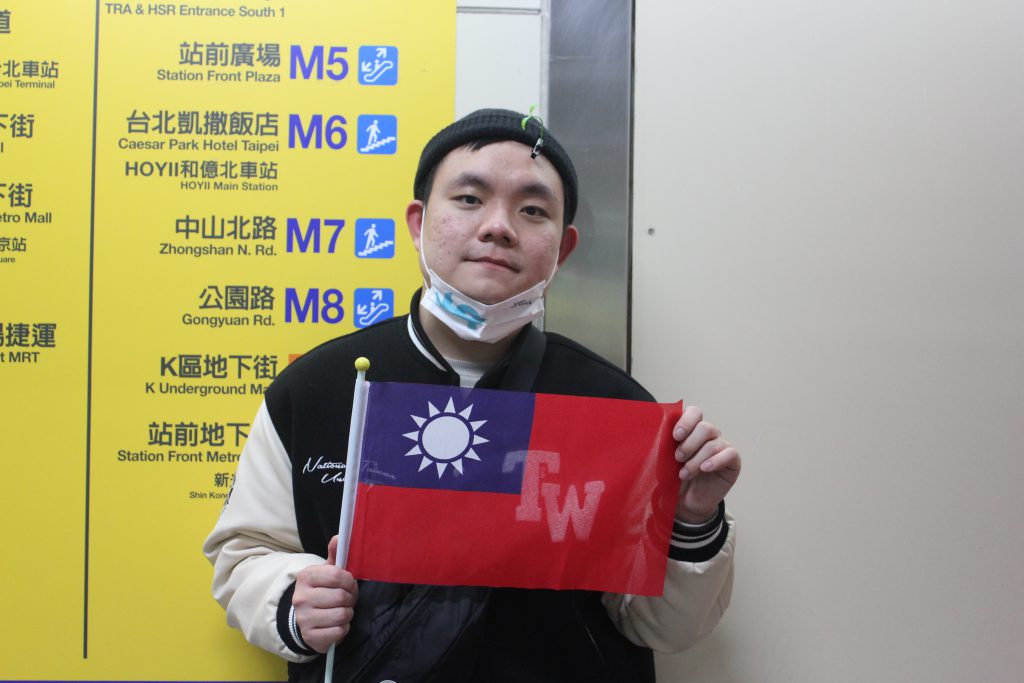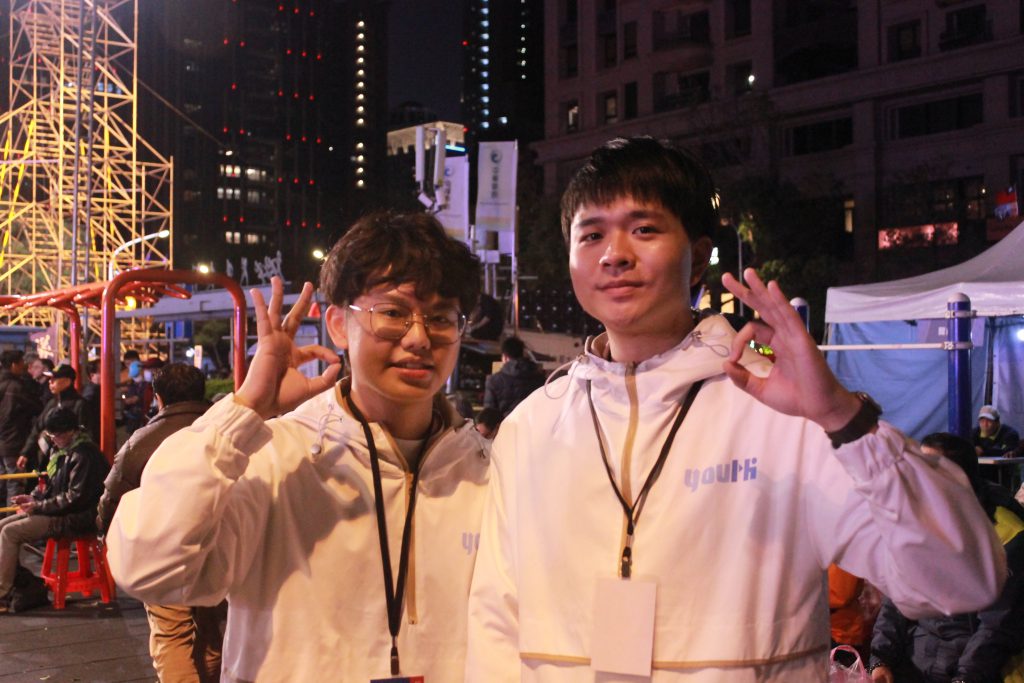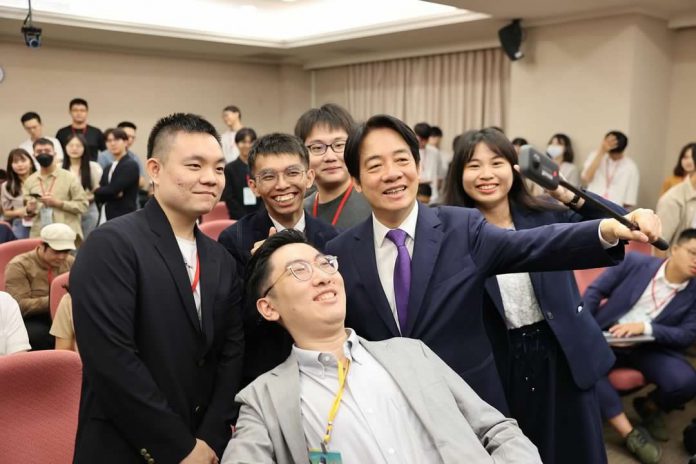More Young Taiwanese Join Parties Pushing for Change.
By Pauline Yau
As a member of the Democratic Progressive Party (DPP) Youth, holding dialogue sessions with lawmakers and young people, taking part in election campaigns and making videos for social media posts are on university student Tsai Ping-an’s duty list.
Tsai joined DPP’s youth organization in 2021. He helped solicit votes at the 2022 Taipei mayor election for DPP’s candidate Chen Shih-chung and the four major referendums in 2021 for issues ranging from environment, and energy to food safety.
In January 2024, Tsai helped (DPP) president-elect Willian Lai Ching-te to solicit votes in the 2024 presidential election.
The 21-year-old says the 2019 social movement in Hong Kong is a wake-up call for him.
“The social movement has made us cherish what (democracy) we have now. We realize how easily it can be taken away,” the National Taiwan Normal University student says.
“There is only one president, and 113 legislators in Taiwan. It is not enough to rely on them alone to make Taiwan a better place. People like us, as their team members and supporters, also have to work hard to help Taiwan move forward,” Tsai says.
He has met many others in his peer group who share the same core values as him at campaign rallies and activities held by DPP.
“Taiwanese of all ages know that our road to democracy has always been rocky. We now enjoy freedom of speech after 38 years of martial law. We can protest. We must work hard to protect our system,” he adds.

Among 19.3 million voters, one million are first-time voters, amounting to six per cent of the total population according to Taiwan’s Central Election Commission. Meanwhile, at least a quarter of voters are between 20-40 years old. The figures show that young voters have a significant impact on the outcome of the election.
In Taiwan, citizens aged 20 years old or above are eligible voters.
Taking My Opinions Into the Legislative Yuan
Li Guan-ting, another university student, shares Cai’s view about civic participation, but does not share his choice of political party. Li joined the Taiwan People’s Party’s (TPP) Youth Organisation in 2022.
“Even though I am not an official member of the political party, I can express my opinion to party members. I hope the party considers my opinion when drafting policy proposals which are submitted to the government,” Li says.
In 2023, he met TPP’s vice-president candidate Cynthia Wu Hsin-ying to discuss issues related to sovereign wealth fund, a state-owned investment fund that invests in real and financial assets such as stocks, bonds, and real estate, at the Legislative Yuan.
“I worry about the sustainability of sovereign wealth funds. It might be hollowed out, leading to financial loss for the public. Cynthia Wu agreed that there are policies that can be formulated to prevent such issues by studying experience in other countries,” Li recalls.
Apart from taking part in policy discussions, Li also runs community services with funding from the party.
“We are not paid. The party distributes funds to us so that we can run community services that we are passionate about, such as taking stray cats and dogs to be vaccinated,” Li says.
Li says there are more opportunities for young people to voice their views in TPP, which was established in 2019, compared with the other two major parties with a longer history, namely DPP and Kuomintang (KMT).
“KMT is a party that is 105 years old. It is less likely to make big changes to the system and the political environment. The two parties have political models that they have been following for years. While it is a relatively stable system, it also means that innovation is rare,” he says.

“If You don’t Care about Politics, Politics doesn’t Care about You.”
University student Lo Yung-sheng has a different view from Li and prefers joining a political party with a long history.
The 22-year-old student joined KMT as a youth league leader in 2022. He thinks the 105-year-old party is pragmatic when dealing with issues such as relations with mainland China, the economy, and the environment.
“KMT’s pragmatic approach can unite the people in Taiwan and really help Taiwan move forward,” he says.
When having discussion with older party members, Lo says that he does not necessarily always have to agree with them.
Among all matters, Lo feels especially frustrated about the visit to the office of Beijing’s envoy to Hong Kong by KMT’s Han Kuo-yu, now the speaker of the island’s legislature, in 2019.
“Taiwanese people are heartbroken about what happened in Hong Kong. I think it is inappropriate for him to do so,” Lo says.
Han, who was then the mayor of Taiwan’s southern city of Kaohsiung, became the first Taiwanese mayor to visit the Liaison Office of the Central People’s Government in Hong Kong, in 2019.
Han’s actions sparked controversies. The visit was interpreted by political commentators as a “political act that falls under the One Country, Two Systems framework.”
Despite his disagreements with Han’s stance on Hong Kong, Lo admits Han has merit regarding stabilizing support from older citizens and protecting national security in Taiwan.
Regarding his peers’ cold attitudes towards politics, Lo insists on voicing out.
“If you do not care about politics, you do not care about your own life. If you do not care about your own life, what you desire will be taken away by politics,” he says.

Young People Lining Up to Join Political Parties
Jeremy Chiang Huai-Che, an associate research fellow of the Foundation for Future Generation points out young people usually are the group that has little interest in politics in most democratic countries.
“But since democracy in Taiwan is still relatively young, youngsters in Taiwan are more passionate about politics,” he says.
The number of young people aged under 40 joining KMT’s young league has been increasing since 2020, from 3676 in 2020 to 6236 in 2022, showing a growth rate of around 69 per cent, according to KMT Organisational Development Committee’s statistics.
Meanwhile, nearly 85 per cent of TPP’s members are under the age of 45, according to TTP’s official statistics.
“Young people became very active in political participation during the Sunflower Student Movement in 2014,” Chiang says.
In 2014, students protested against the passing of the Cross-Strait Service Trade Agreement by the then ruling KMT at the legislature without a clause-by-clause review. The youngsters perceived the agreement with the People’s Republic of China would harm Taiwan’s economy. They occupied the Legislative Yuan as an act of defiance.
Chiang adds that Ko Wen-je, a presidential candidate for the 2024 election, has helped encourage more young people to participate in politics.
“Ko Wen-je has made use of young people’s dissent regarding the economy to gain support in the presidential election. He has also successfully gained support from the young with social media tactics,” Chiang says.
“Most young people are interested in politics now, even those who are too young to experience the Sunflower Movement,” he says.
Edited by Kamun Lai
Sub-edited by Charlotte Wu







































